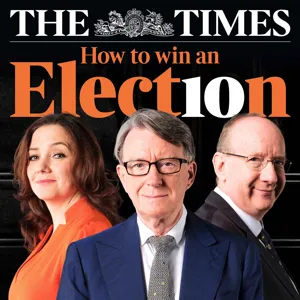Podcast Summary
Mint Mobile's reverse auction pricing strategy attracts new customers during inflation: Mint Mobile offers discounted $15/month price for new customers for 3 months, totaling $45 upfront, to attract new clients amidst inflation. Luton Rising, airport owners, highlighted their community contributions.
Mint Mobile, a wireless service provider, is offering a discounted price of $15 a month for new customers for the next three months, bringing their total cost to $45 up front, including taxes and fees. This reverse auction-style pricing strategy is aimed at attracting new customers during inflation. Additionally, Luton Rising, the community-focused owners of London Luton Airport, were featured in the podcast, highlighting their significant contributions to the local community, including employment and charitable donations. The episode also included a light-hearted conversation between the hosts and their guests, including a reference to a past singing performance by Peter Mannes and an attempt to contact a singer from a 1986 Labour event.
Focusing on election-winning strategies during party divisions: Effective leaders prioritize what helps their party win elections to reduce incentives for division, addressing underlying reasons beyond just the issues.
During times of division within a political party, the most effective strategy for a leader is to focus on what they believe will help their party win elections. This reduces the incentive for individuals to divide themselves from the leader and positions the party for success. The discussion also touched upon the challenges Prime Minister Danny faces in accommodating his angry MPs and the potential consequences of rebels backing amendments, particularly regarding net migration and leaving the European Convention on Human Rights. The importance of addressing the underlying reasons for divisions within a party, beyond just the issues at hand, was emphasized. This includes individuals positioning themselves for future leadership opportunities and wanting to avoid being held responsible for the party's decisions.
Leaders can strengthen their position by making unpopular but necessary decisions: Making tough decisions, even if unpopular, can enhance a leader's image and position, as demonstrated by Peter Mandelson and Keir Starmer.
In politics, making unpopular but necessary decisions can actually strengthen a leader's position, even if it means going against the advice of dissenters or popular opinion. Peter Mandelson and Keir Starmer's experiences demonstrate this principle. Mandelson helped Labour Party win elections by persuading key figures to align with the winning side, even if it meant moving against their ideological leanings. Starmer, on the other hand, faced rebellion from his own party over a Middle East ceasefire issue but ultimately took a firm stance, which many in the public saw as a sign of leadership and strength. This approach allowed Starmer to depart from his earlier focus on party unity and instead prioritize doing what was right for the party and the public. The question of whether strength comes before or after electoral success is a chicken-and-egg issue, but leaders who are confident in their position can take tough decisions and face opposition more effectively.
Leading from a centrist position despite internal conflicts: Effective leaders show strength and prevail in internal battles to bridge the gap between right and winning public opinion, enhancing their image rather than weakening it.
In politics, having the strength to suppress dissent and appeal to the moderate public opinion is crucial for winning elections. This concept was exemplified by leaders like Thatcher and Blair, who were able to lead their parties from a centrist position despite internal conflicts. However, it's important to note that there can be a gap between what is right and what will win an election. Showing strength and prevailing in internal battles can help bridge that gap and prevent the public from perceiving a leader as weak. Ultimately, winning these battles is critical for emerging from conflicts enhanced rather than weakened.
Political showdowns and internal strife: Historical examples show that transparency, clarity, and firmness as a leader may not be enough to bridge the gap when public opinion diverges. Void from previous leadership and hard left efforts can create internal strife and power shifts.
Maintaining transparency, clarity, and firmness as a leader is essential but may not be enough to bridge the gap when public opinion diverges from your position. Historical examples of political showdowns illustrate this challenge. In the context of the ongoing discussion, the potential trap Jeremy Hunt has set for the Labour Party with spending cuts could create internal strife and polarization, potentially leading to a power shift towards the hard left. However, the impact of this situation may not be solely due to the cuts themselves but rather the void created by previous leadership and the hard left's persistent efforts to divide and mobilize support around contentious issues. Despite their diminished organizational strength since the Corbyn era, they continue to look for opportunities to create discord within the party.
The timing of economic conditions in elections: Political parties face conflicting positions and public expectations regarding spending and taxes during elections. Historically, parties have struggled to balance these pressures, as seen in the case of tuition fees and Labour's desire to spend more while keeping taxes low.
The timing of economic conditions leading up to an election can significantly impact the outcome, as political parties are often faced with conflicting political positions and public expectations regarding spending and taxes. For instance, Jeremy Hunt's economic strategy may not provide a soft landing for the Conservatives at the right time, while Labour faces challenges in balancing its desire to spend more with the need to keep taxes low to win elections. Historically, this dynamic played out in the case of tuition fees, where the Liberal Democrats' promise to abolish them in the 2010 election evolved into a commitment to vote against any increase and introduce a fairer alternative. However, the specifics of a fairer alternative remained unclear. These issues illustrate the complexities of political leadership and the importance of navigating economic conditions and public expectations in the context of an election.
Decisions have long-term consequences: Political decisions can have unforeseen consequences, and avoiding tough issues may lead to hypocrisy and dissent later.
Political decisions, especially those involving policy pledges, can have significant consequences that may not be fully understood or appreciated until much later. In the case of the Liberal Democrats, a decision to fudge a policy on tuition fees led to a gap that was exploited by campaigners, resulting in a hypocritical stance for some MPs and members. This issue became a lightning rod for dissent against the Lib Dems and their coalition government with the Conservatives. The speaker also noted that there were other sources of dissent, such as being in government at all and the AV referendum, which also took a toll on the party's polling. In 2009, Nick Clegg saw an opportunity to address the issue of university funding, but chose to set up a commission instead of fighting over the tuition fees at that time. However, the consequences of this decision would come back to bite the party when they were in government. It's a reminder that the political game can have long-term repercussions and that principled positions may not always be what they seem.
Political leaders' difficult decisions and broken promises: Staying true to promises is crucial for political leaders, even when facing tough decisions or opposition, to maintain trust and avoid negative consequences.
Political leaders sometimes face difficult decisions that go against their party's interests or public opinion, but failing to follow through on those decisions can lead to negative consequences. During the coalition government in the UK, Nick Clegg, the Deputy Prime Minister and Liberal Democrat leader, made a pledge against university tuition fee increases. However, he later went against this promise and supported the Conservative-led government's plan, leading to significant backlash and criticism. This decision was perplexing, as Clegg's Liberal Democrats heavily relied on university students and high-paid public servants for votes. However, Clegg believed that the broader policy was necessary to protect universities from austerity's impact. Despite this, he couldn't see that he was bound to his initial pledge, which ultimately led to his political downfall. This example highlights the importance of staying true to one's promises, even when faced with difficult decisions or opposition from within one's party.
Rare occurrence of coups due to high personal cost and limited individual benefit: The Labour Party's leadership turmoil before the 2010 election illustrates how fear of personal consequences and lack of a clear candidate hindered a coup, ultimately leading to the loss of public trust and the end of the Labour government.
Coups, or attempts to overthrow a political leader, are rare due to the high personal cost and the limited individual benefit. This was evident during the Labour Party's leadership turmoil before the 2010 general election, where despite clear reasons to remove Gordon Brown, no one was willing to take the risk. The lack of a clear candidate and the fear of personal consequences hindered any successful coup. The failure to maintain a modernizing project and demonstrate clear strategy and purpose under Gordon Brown ultimately led to the loss of public trust and the eventual end of the Labour government.
Dissent in political parties: A double-edged sword: Dissent within political parties can be time-consuming but offers leaders a chance to define themselves to voters. Traditional methods like leaflets still have value, but digital communications are becoming more popular.
Dissent within political parties can consume significant time and resources for leaders, but it also provides an opportunity for them to define themselves to voters through their responses to the dissent. While leaflets may seem outdated in a digital age, they still hold value for parties like the Liberal Democrats that have successfully used them in their campaigning strategies. However, the trend is moving towards more targeted and personalized digital communications. Ultimately, the effectiveness of both dissent and traditional campaigning methods depends on how they are utilized by political leaders.
The importance of a balance between traditional and digital campaigning: Effective campaigns require a mix of personalized digital and traditional methods like leaflets for maximum voter engagement and impact.
While digital campaigning offers personalization and convenience, traditional methods like leaflets still hold significance in elections. The personal touch of a well-designed leaflet can start conversations and engage voters in a way that digital campaigns may not be able to fully replicate. However, sustainability concerns and potential safety issues with letterbox design are valid concerns. Ultimately, effective campaigning requires a balance between traditional and digital methods to reach and engage voters in a meaningful way. The Liberal Democrats' continued use of paper campaigns in by-elections highlights the importance of this balance. Additionally, the design and quality of printed materials can make a significant impact, as seen in the highly effective Labour Party materials during the Nadine Dorries by-election. While digital is the future, the power of a physical piece of communication should not be underestimated.
Try Stamps.com risk-free with added perks: Businesses can test Stamps.com services with a 4-week free trial, no contracts, and additional perks like free postage and a digital scale.
Stamps.com offers a risk-free trial for businesses to explore its services with additional perks, such as free postage and a digital scale. Over a million businesses have already made the same decision to streamline their mailing processes with Stamps.com. The sign-up process comes with no long-term commitments or contracts, making it an attractive option for businesses looking to test the waters before making a long-term investment. By signing up with the code program, new users can enjoy a 4-week trial to experience the benefits of Stamps.com firsthand. This approach allows businesses to assess the value of the platform and its features before making a commitment, ultimately making the decision to join an extensive community of satisfied customers.






